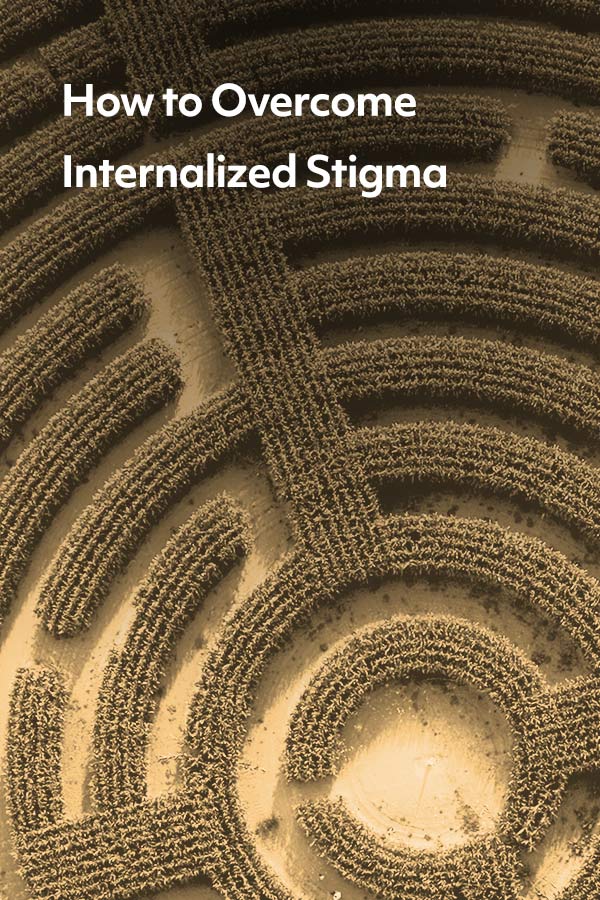For nearly 20 years, I kept my bipolar disorder a secret.
Even though I was doing everything right, I still allowed shame—both internalized stigma and fear of societal stigma against mental illness—to prevent me from feeling confident.
For two decades, I’d been taking my medication without fail, avoiding alcohol and drugs, even caffeine, to protect my sleep. I saw my therapist and psychiatrist regularly and performed the hard emotional labor to heal, to process my triggers and traumas. With this commitment to treatment and wellness, I thrived.
On the surface, I had the picture-perfect life—happily married for over 10 years and mom to a hilarious, bright child and incorrigible, adorable rescue pup and working as a marketing manager at one of the most successful corporations in the world. But up until 2019, the secret of my bipolar diagnosis, which I kept from my colleagues, my employer, and most people I knew threatened everything.
Shame convinced me that if others found out about my mental illness—no matter how well managed—they would reject me and I would lose it all. Shame put up a wall in my relationships and I never fully let people in. Shame kept me feeling alone—I felt smaller and smaller until I couldn’t take it anymore.
I dived into a negative spiral, but it helped me see that my problem was now with shame and stigma, not my bipolar condition. As the next step in my recovery, I embarked on a process to overcome shame and internalized stigma.
What is internalized stigma?
Internalized stigma was not something that was on my radar until I became aware of how much it was holding me back. I interviewed licensed psychotherapist Kristie Tse on what it is. “Internalized stigma is the shame you learned from the people around you growing up. It’s not yours,” said Tse. “As kids, we know nothing about mental health. We share our thoughts openly and express our emotions freely. We cry when we want to cry. We laugh when we want to laugh. But when you witness, listen to, and absorb the negative stereotypes around emotions and how you express them, you start to believe those thoughts and messages without thinking about where it comes from.”
Recognize the damage of internalized stigma
Tse added, “[Internalized stigma] is harmful because you start to keep your struggles a secret and you shy away from seeking help.”
Indeed, for far too long, I held an “I may have bipolar but I’m not one of them” type of ableist mentality. Because I’m privileged to be high achieving and pass as someone without a severe, chronic mental health condition, I wanted to distance myself from others who fit society’s negative stereotype of mentally ill as much as possible. What I didn’t realize was that this is a form of self-hate. I was buying into the stigma, the stereotypes that I was conditioned with about people living with mental illness. I was accepting the idea that I was unworthy as I am, unworthy because of my struggles. In staying silent, I was not only extremely insecure but unable to be part of the solution in fighting mental health stigma.
“It becomes hard to know the difference between thoughts that serve you and thoughts that limit you,” Tse continued, “which makes it harder to take purposeful action that can enrich your life.”
Join peer support groups
Once I realized how dangerous internalized stigma and shame was, I went out searching for an additional kind of help–community. I wanted to find others who knew what it was like to experience what I’m going through, facing stigma at work, imposter syndrome, and balancing work and family while managing mental health.
This was terrifying as someone who has never told a stranger, let alone a group of them, that I live with bipolar disorder. I took over a year to work up the nerve to seek this kind of help. When I finally joined peer support groups at my local chapter of NAMI and The Stability Network, the difference was immense. I regretted having waited so long. For the first time, I found safe spaces where I can talk about my struggles openly with people who understand firsthand. Meeting after meeting, my mind and heart opened wider. I became much less judgmental about myself and others who live with severe mental health struggles. These meetings—and the wonderful people I met—helped me become more compassionate toward myself and others. By sharing and listening, I felt the shame inside diminish. I became much less afraid of my own diagnosis. Together, we were attacking the internalized stigma that was holding us back.
“Shame can only thrive in secrecy,” said Tse. “The more you talk about it, the less stigmatizing it becomes.”
Read mental health recovery stories
Detour: My Bipolar Road Trip in 4-D by Lizzie Simon was the first book that I discovered after my diagnosis and it made me feel less alone. Since then, I have been inspired by many other wonderful memoirs written by authors with lived experience, including Marbles by Ellen Forney, Madness: A Bipolar Life by Marya Hornbacher, I’m Telling the Truth but I’m Lying by Bassey Ikpi, Mental: Lithium, Love, and Losing My Mind by Jamie Lowe, and Gorilla and the Bird by Zack McDermott. Reading about the mental health journeys of others helped me to normalize living with a chronic health condition like bipolar disorder and empowered me to live my own life without shame.
Admit my struggles
After concealing my mental health condition for nearly two decades, I realized that I was hiding my struggles even from myself. I tried to pretend everything is always okay, not allowing myself the space to acknowledge when something is hard. This was not healthy. After my time in support groups and educating myself through books and more, I recognized that I can’t advocate for myself, or anyone, if I don’t admit my own struggles.
I could no longer stay silent when a colleague complained to me that her boss is “acting bipolar” or if anyone said that someone is “psycho.” To speak up and advocate for change, I had to set the record straight for myself and my community.
Share my story
My 20-year-old self would never have believed that life actually works out. For too long, I did not think a happy life was in the cards for someone with a severe mental health condition—but I was wrong. I’ve learned that as a thriving, happy individual with bipolar disorder, I am in the majority of people living with a mental health condition, not the minority. I’ve joined the fight to change the narrative.
In 2019, my essay called “My Mental Illness Didn’t Stop me from Succeeding, but the Stigma nearly Did” was published in HuffPost. I was terrified of the potential backlash of coming out so publicly, but for the first time, I felt free. I could breathe.
Sharing publicly about your mental health journey is a personal decision. I’m in no way recommending anyone who does not feel ready to do so. (And unfortunately, disclosing at work may still carry another layer of complications, even though mental health conditions are protected under the Americans with Disabilities Act.) But for me, telling the world about my deepest past shame was how I was able to let it go.
Show myself compassion
A lifetime of conditioning takes time to undo. I still feel shame about my mentally ill label at times, in particular about how my openness might negatively stigmatize my child. I’m apprehensive when new neighbors or my kid’s teacher learn about my writings and therefore, my mental health condition. Though I continue to fear rejection, it is much less severe. I am much stronger than I was before. I have uncovered a confidence that I was never able to own when I was in hiding.
And because I share my experience openly, so many have reached out to me—from strangers who’ve read my writings, to people I’ve known in the past. Each person shares that they too struggle and that my story made them feel less alone. Each time, I’m comforted and validated to answer—We certainly are not alone. We never were.










